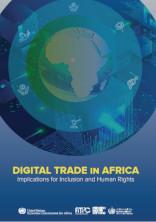Digital Trade in Africa: Implications for Inclusion and Human Rights

In July 2017, the African Trade Policy Centre of the United Nations Economic Commission for Africa (ECA), the Office of the United Nations High Commissioner for Human Rights (OHCHR) and the Friedrich-Ebert-Stiftung Geneva Office launched a joint report entitled The Continental Free Trade Area in Africa: A Human Rights Perspective. The publication contained a critical assessment of the human rights dimensions of what is to be the biggest trade agreement in terms of the number of participating countries since the establishment of the World Trade Organization.
Since that date, significant headway has been made towards establishing the African Continental Free Trade Area. The landmark Agreement Establishing the African Continental Free Trade Area, covering trade in goods and services, was signed in Kigali on 21 March 2018 by representatives of 44 Governments. As of 8 May 2019, an additional eight Member States had signed the Agreement, and the 22 ratifications required for the Agreement to enter into force had been received.
The Agreement includes a built-in agenda for a second phase of negotiations on competition policy, intellectual property rights and investment. However, if the African Continental Free Trade Area is to fulfil its potential in transforming African economies, it must also include a clear digital strategy. This has led to discussions on whether e-commerce should be included in the second phase of negotiations. At the same time, although the digital economy and the dynamism generated by digital trade solutions create significant opportunities, they also present challenges that will need to be addressed in a way that is inclusive, transparent and consistent with people-centred governance and the attainment of human rights.